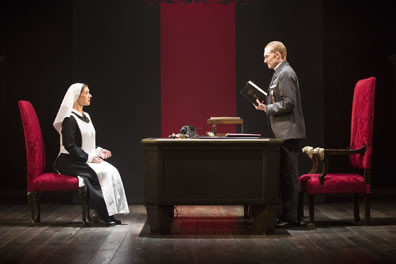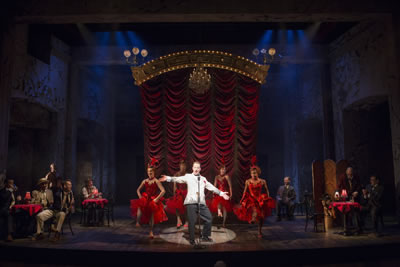Measure for Measure
The Agony in Ecstasy
Shakespeare Theatre Company, Lansburgh Theatre, Washington, D.C.
Monday, September 23, 2013, K–111&112 (center stalls)
Directed by Jonathan Munby
Ecstasy is a religious state of mind, an inner spiritual awareness that results in euphoria. Ecstasy is also a sexual state of mind, an orgasmic moment that results in euphoria. In the three over-arching western religions—Christianity, Islam, and Judaism—immorality and immortality vie for control of the individual's soul through the same device: ecstasy.
No wonder we're all so screwed up.

Angelo (Scott Parkinson) lays the groundwork for his sexual propisition to Isabella (Miriam Silverman) in the Shakespeare Theatre Company's production of Measure for Measure. Below, Cameron Folmar emcees the pre-play cabaret. Photos by Scott Suchman, Shakespeare Theatre Company.
Jonathan Munby explores this dueling duality of human ecstasy in his insightfully conceived and intelligently directed production of William Shakespeare's Measure for Measure at the Shakespeare Theatre Company. In presenting Shakespeare's comic drama about extremes of morality—which juxtaposes the legally lax, libertine society that prospered under Duke Vincentio with the legally strict, puritanical rule of his substitute, Angelo—Munby concentrates not on the great divide between what's good and what's bad but on their collision in the inner loins of the individual. This plays out with a solidly talented cast in a conceptual context effectively brought off by the design team of Alexander Dodge (set), Linda Cho (costume), and Philip S. Rosenberg (lighting).
Don't let that context and Munby's production framework waylay you from the interpersonal dynamics the director has mined in Shakespeare's text. The play's setting of Vienna is where Sigmund Freud practiced, putting into a scientific context what Shakespeare put in a dramatic context with this play: the conflict between sexual urges and societal standards. Much of Freud's work in this field came in the 1920s and '30s, and it's easy to transfer to the Vienna of that time the Berlin of the Weimar Republic where creativity from graphic arts to architecture flourished, decadence surfaced in the social fabric, and the Great Depression gave rise to Nazism.
Welcome to Cabaret my friend. Munby is clearly influenced by that musical (you can purchase the movie version in the lobby gift shop) as the production features a 20-minute preshow cabaret. A music hall stage with a tattered red-velvet curtain sits among gray peeled-paint walls. With Lucio serving as the emcee, Pompey and Mistress Overdone roam among the patrons of both the cabaret and the Lansburgh Theatre, and, intriguingly, Mariana comes on the cabaret stage dressed in a black gown singing a torch blues number. You'll see some of the cabaret patrons show up later in the play's plot, and one right away: Vincentio, the Duke, a despondent gay man bothered by both his homosexuality and the hedonistic culture his governance has fomented.
Just as Cabaret is ostensibly about the transition of a German society from libertine ethos to fascism, this Measure for Measure seems headed in the same direction. The cabaret gives way to sparse sets for the convent and court while modular sections of jail bar walls are moved around in military precision by the guards to create different settings within the prison. The Duke, Kaiser-like, wears a traditional military uniform, but Nazi-style-eagle black and red banners and armbands abound, the police are dressed as Gestapo guards, the Provost as an SS officer. Setting Measure for Measure in the age of the Third Reich is most fitting, as Hitler and his goons instituted a strict moral order while engaging in illicit behavior themselves. Had Munby relied solely on this allegorical context, we'd applaud his cleverness.
But his genius goes much deeper. The key moment in the cabaret preshow is the last number, that of the stripper nuns. This is the production's first image of sex and religion springing from the same font. When Angelo tries to pray before meeting Isabella for the second time, his vision of three nuns praying with him turns into a fantasy of the three nuns making sexual advances on him. "When I would pray and think, I think and pray to several subjects," he says as he dissipates the fantasy. "Heaven in my mouth, as if I did but only chew his name, and in my heart the strong and swelling evil of my conception"—or, as Drummond notes of the biblical Abraham's lineage in the play Inherit the Wind, "all these holy people got themselves 'begat' through 'original sin'?"
Angelo similarly links lust to Isabelle's holiness after their first meeting: "What dost thou? Or what art thou, Angelo? Dost thou desire her foully for those things that make her good?" Virtue becomes Angelo's sin because it is inseparable from his very being and thus from his sexual drive. "The state whereon I studied is like a good thing, being often read, grown seared and tedious: yea, my gravity, wherein—let no man hear me—I take pride, could I with boot change for an idle plume which the air beats for vain."
Scott Parkinson plays Angelo as a small, weak man in manner and posture, an able administrator who, when given the mantle of leadership, uses it as a license for tyranny, perhaps unleashing the pent-up righteous frustration of a career bureaucrat. Munby makes a risky choice in having Angelo physically assault Isabella during their second interview rather than merely putting her in a verbal trap. This stage business, though, works in giving the audience immediate understanding of Isabella's fear threading through Shakespeare's text. She is not some prude willing to trade her brother's life in order to keep her chastity; she is a woman threatened with rape by the most powerful man in the state.
Miriam Silverman plays Isabella as a skitterish meerkat at first who eventually experiences her own sexual awakening—albeit, a rude awakening—and, with it, a growing awareness of life's many inequities. Her maturation climaxes with the revelation of the friar as Vincentio at the end, whereupon Silverman's Isabella stares at the uncovered Duke with a shock borne out of fear and some anger as she looks upon a man who, ultimately, had violated her trust in so many ways.
As with Angelo and Isabella, the Duke (Kurt Rhoads) in this production has pent-up desires, but he's uncertain what those desires bode. At the cabaret, he beats off his boy toy, then, looking at the decadence around him, literally phones in his opening abdication speech to Escalus (a dignified Jack Wetherall who becomes deeply bothered by Angelo's unbending approach to rule). But as Vincentio takes on the role of the friar, a competent, self-assured manager emerges. Rhoads gives a sturdy, commanding performance as Vincentio, especially as he stage-manages the unmasking of Angelo in the final act. We root for him all the way. It is at this point that this Duke discovers real virtue in himself, and he equates it with the woman he has guided to a point of true redemption. The great conundrum of Measure for Measure is how to play Vincentio's marriage proposal to Isabella; here, she expresses appreciation but returns to the convent. The Duke is left with the specter of his own homosexuality overshadowing him, and we are left with the final image of the Duke devoid of either sexual or moral satisfaction.
"Ere he would have hanged a man for the getting a hundred bastards, he would have paid for the nursing a thousand: he had some feeling of the sport: he knew the service, and that instructed him to mercy," Lucio says of the Duke—but he says it to the disguised Duke who responds, revealingly, "I never heard the absent duke much detected for women; he was not inclined that way." Lucio, of course, is painting his own picture of righteousness and coloring the Duke to fit the picture. And, too, this interchange is played as a joke, earning a laugh.
Yes, this is a comedy. Measure for Measure is placed in the comedy section of the First Folio, and it has a wonderful array of comic characters from Pompey the bawd and Elbow the constable to Lucio the braggart lothario. It also has one of Shakespeare's more Monty Python moments with the prisoner Barnadine refusing to be executed because he is too drunk to die. Despite his psychological plumbing into the play's serious themes, Munby never ever forgets he's staging a comedy, and the laughs come easily and often. Credit goes to great comic performances from Chris Genebach as the casually witty Pompey, Hugh Nees as Dogberry-reincarnated Elbow, Andrew Criss as the dubiously proud executioner, and Dan Istrate as a slacker Barnadine.
 Cameron Folmar fully wrests the production from the clutches of serious drama with his hilarious turn as Lucio. A gallant in style and manner, Folmar borrows the personality of Algernon from The Importance of Being Earnest to compose his Lucio, so self-aware in his ironic wit while pulling off site gags such as putting himself in Pompey's mug shot in the prison. The scenes he shares with Rhoads' Duke are pure comic duo set pieces, and for the final act, standing off to the side, Folmar delivers Lucio's interjections so perfectly that they not only intrude on the Duke's carefully managed pageant they also stab into our own conscious as unexpected surges of humor.
Cameron Folmar fully wrests the production from the clutches of serious drama with his hilarious turn as Lucio. A gallant in style and manner, Folmar borrows the personality of Algernon from The Importance of Being Earnest to compose his Lucio, so self-aware in his ironic wit while pulling off site gags such as putting himself in Pompey's mug shot in the prison. The scenes he shares with Rhoads' Duke are pure comic duo set pieces, and for the final act, standing off to the side, Folmar delivers Lucio's interjections so perfectly that they not only intrude on the Duke's carefully managed pageant they also stab into our own conscious as unexpected surges of humor.
Two other singular performances are turned in by Avery Clark as Claudio, who delivers his lines as if he were a young political firebrand, and Eric Martin Brown as the crisply military Provost. Dressed in a uniform that makes you think of Heinrich Himmler, Brown balances the Provost's oath of duty with his desire for real justice, and his sense of honor ends up being bound in his faith in a higher authority, represented by the Duke disguised as a friar (to this Provost, that higher authority he believes to be God is, in fact, his true commander in chief).
Munby's Shakespearean sensibilities are pronounced in minor but telling details in the action. In one scene, prostitutes at the back of the stage display the destitution that leads to despair when they can't even sell their bodies for money. When Claudio is unmasked at the end, the eyes of Parkinson's Angelo perceivably glow through his hitherto death-wish demeanor as he discovers Claudio still alive and understands the true meaning of mercy displayed by the Duke. It's an expression inspired by Vincentio's observation that "By this, Lord Angelo perceives he's safe, methinks I see a quickening in his eye." And what should Claudio do when he realizes he's been spared? He turns to greet the man who took the first step toward his salvation, Lucio—before the Duke brings Lucio to his final reckoning for all his sins.
Vincentio is the play's hero for setting the trap that brings down Angelo and makes all right in the end, but Lucio is the one whose pure friendship for Claudio sets everybody on the road to redemption. The lothario is the savior. Leisure answers leisure, like doth quit like, measure still for measure. Ecstasy vies with agony in juxtaposition, in succession, and simultaneously, too.
Eric Minton
September 26, 2013
This review also appears with more photos at PlayShakespeare.com
Comment: e-mail editorial@shakespeareances.com.
Start a discussion in the Bardroom



 Find additional Shakespeareances
Find additional Shakespeareances